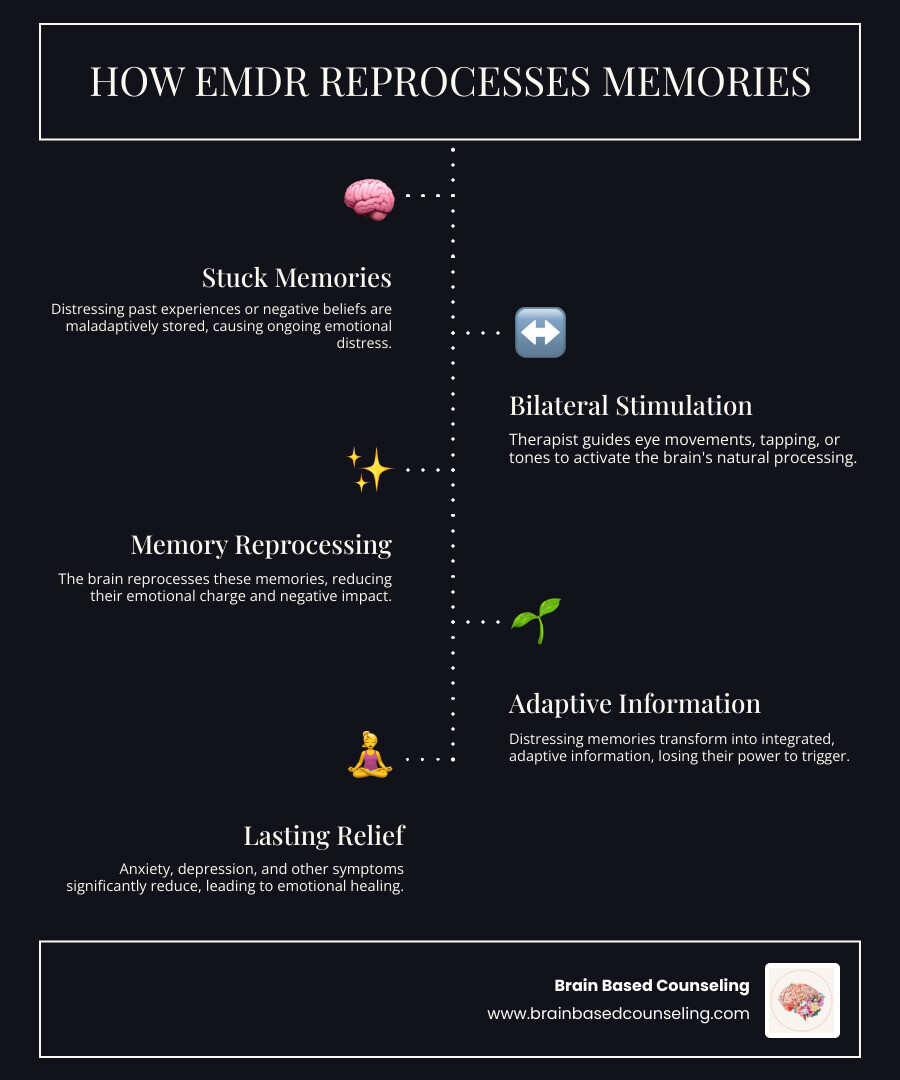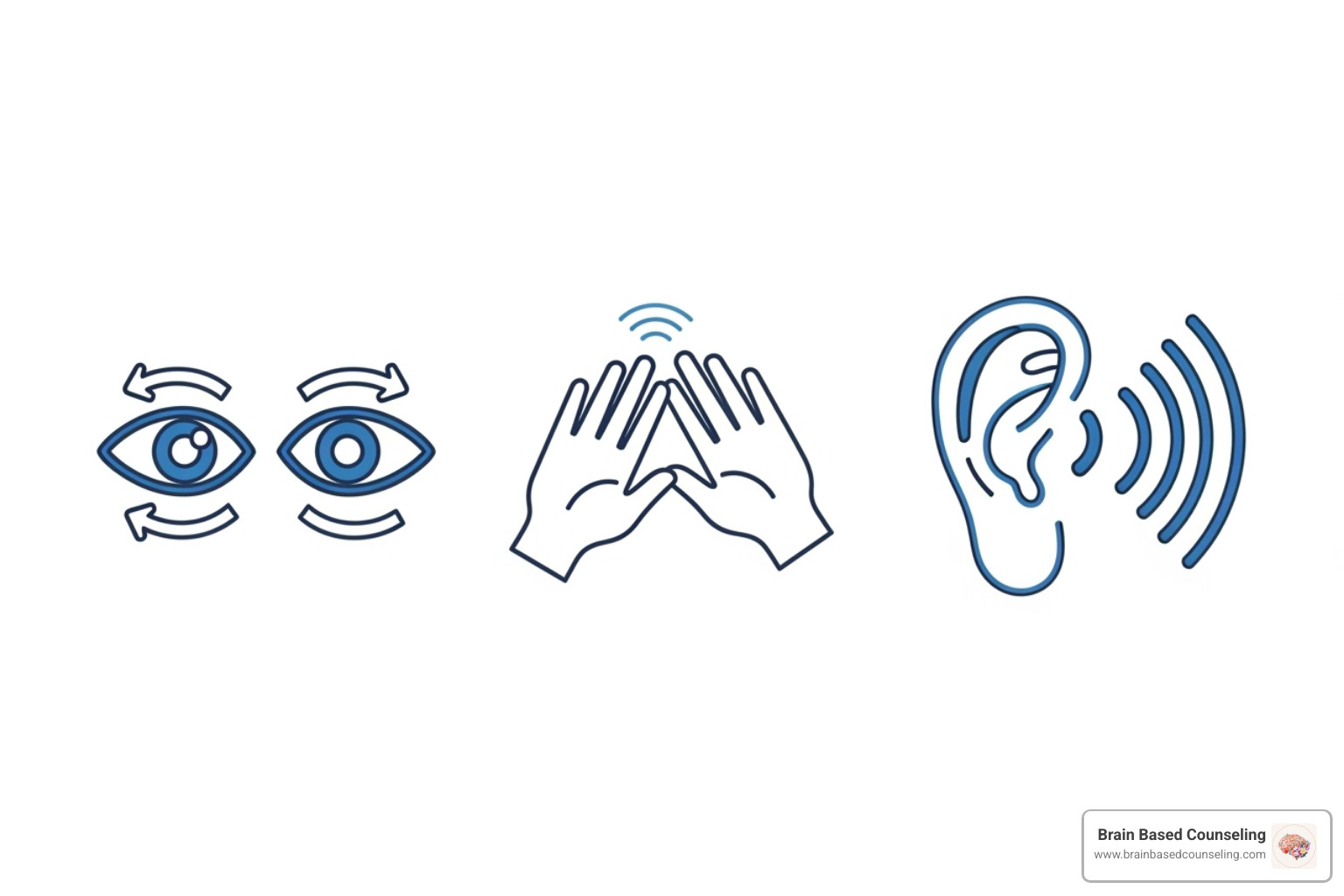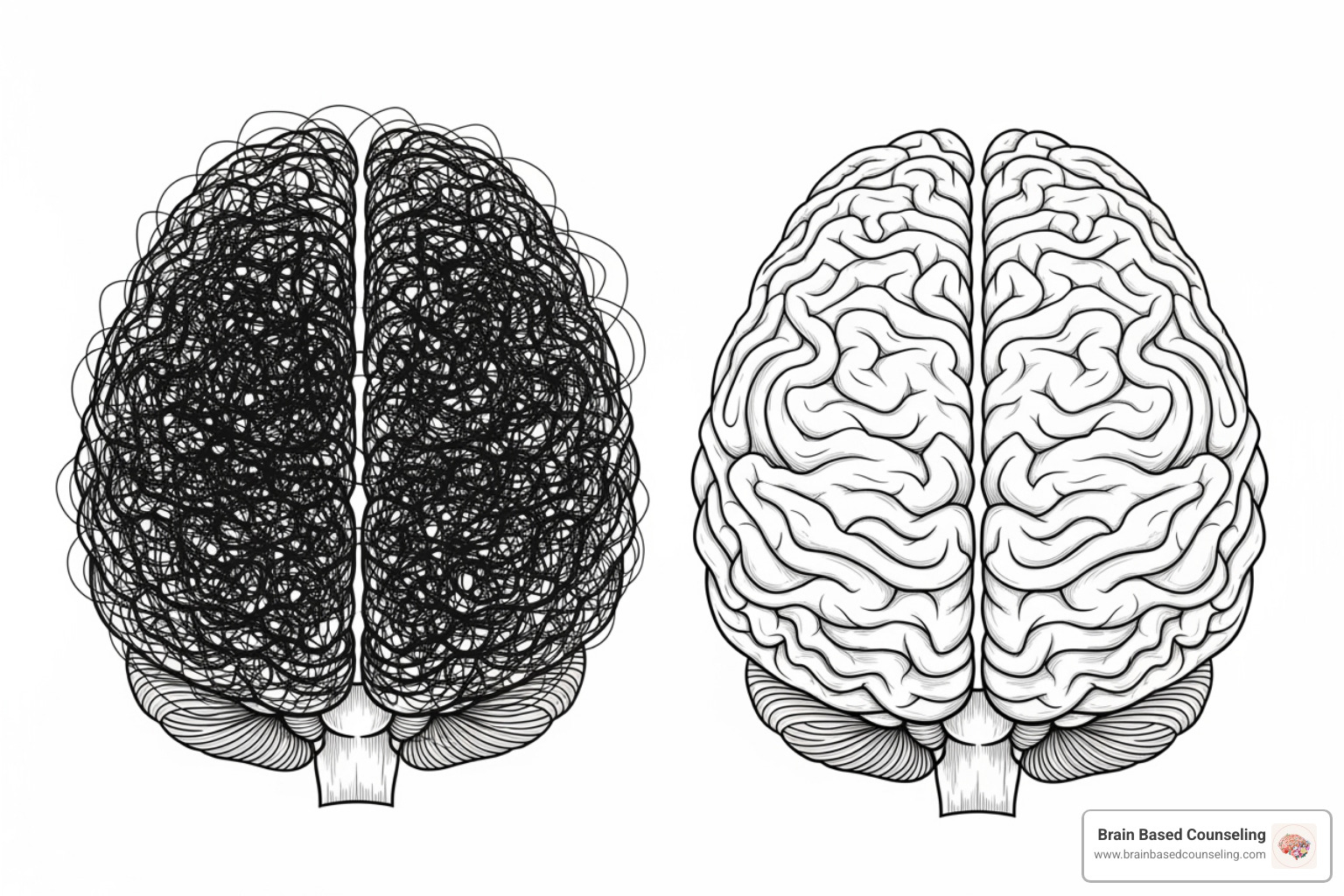EMDR Therapy for Anxiety and Depression: A Neuroscience-Driven Path to Healing

Understanding Your Journey to Deep Emotional Healing
EMDR therapy for anxiety and depression offers a revolutionary, science-backed approach that goes beyond traditional symptom management. Eye movement desensitization and reprocessing (EMDR) addresses the root causes of emotional distress, including adverse childhood experiences and traumatic memories that fuel current struggles. This concentrated therapeutic approach, delivered through EMDR therapy sessions in an intensive format over 1-3 consecutive days, provides the focused attention your healing deserves.
At Brain Based Counseling in Cincinnati, Ohio, I'm Libby Murdoch, a licensed professional clinical counselor and certified clinical trauma professional. As an experienced EMDR therapist, I specialize in delivering personalized EMDR treatment to high-achieving women, those healing from betrayal trauma, and first responders throughout the Cincinnati area—including Indian Hill, Madeira, Hyde Park, Mason, Mount Lookout, Mount Adams, and Terrace Park—as well as virtually throughout Ohio and North Carolina.
My neuroscience-driven, trauma-informed approach combines cutting-edge EMDR therapy techniques with brain and body-based healing methods, creating transformative results for motivated individuals ready to invest in their mental health. This specialized EMDR practice focuses on treating posttraumatic stress disorder, anxiety disorders, and depressive disorders through intensive therapeutic experiences.
The Science Behind EMDR: How Your Brain Naturally Heals
Picture your brain as an sophisticated information processing system. Most experiences are naturally processed and integrated into your memory networks. However, when overwhelming traumatic events occur—whether major traumas or smaller yet significant experiences—these traumatic memories can become "stuck," creating ongoing anxiety symptoms, depression, and emotional distress.
Developed by Dr. Francine Shapiro, eye movement desensitization and reprocessing (EMDR) harnesses your brain's natural healing capacity. Unlike approaches that focus solely on coping strategies, EMDR therapy uses bilateral stimulation—rhythmic left-right eye movements, gentle tapping, or auditory tones—to help your brain reprocess these frozen traumatic memories.
The research supporting EMDR treatment is compelling. The World Health Organization and the American Psychiatric Association endorse EMDR therapy as an effective treatment for trauma-related mental health conditions. Studies demonstrate that 87.5% of individuals with major depressive disorder experience significant improvement through EMDR therapy, with 62.5% achieving complete remission from depressive symptoms.
How Eye Movement Desensitization Creates Neurological Change
When traumatic experiences overwhelm your nervous system, traumatic memories become frozen with their original emotional charge, body sensations, and negative thoughts. The eye movement desensitization process facilitates a unique state of dual attention—you remain aware of both the disturbing event and your present safety simultaneously through guided eye movements.
This movement desensitization and reprocessing allows your brain to move stuck traumatic memories from their frozen state into your adaptive memory networks. The emotional intensity naturally decreases, negative emotions transform, and your nervous system learns that the danger has passed. Your brain forms new neural pathways through this desensitization and reprocessing EMDR approach, creating lasting change from the inside out.
The eight phases of EMDR therapy provide a structured framework for this transformation. Each EMDR therapy session follows basic principles of reprocessing therapy, ensuring systematic processing of traumatic stress while maintaining your safety and stability.

Who Benefits from Personalized EMDR Intensive Therapy?
The intensive format of EMDR therapy provides concentrated healing time, allowing for deeper processing and more comprehensive treatment outcomes. This approach is particularly effective for motivated individuals who value privacy, personalized care, and results-driven mental health treatment. My specialized EMDR practice serves:
High-Achieving Women with Anxiety Disorders: Professional women and entrepreneurs who struggle with perfectionism, constant worry, and the pressure to excel. EMDR therapy addresses the root traumatic experiences that fuel high-functioning anxiety, helping you reclaim inner calm while maintaining your drive for success. Through targeted EMDR sessions, we process the emotional trauma underlying persistent anxiety symptoms.
Women Healing from Betrayal Trauma: When trust has been shattered by infidelity, deception, or emotional betrayal, intensive EMDR treatment provides the focused attention needed to process these complex wounds. We address both the traumatic event and the negative belief systems it created, helping you rebuild confidence in your judgment and worth through specialized eye movement desensitization techniques.
First Responders with Traumatic Stress: Police officers, firefighters, EMTs, and other first responders face cumulative trauma exposure that can lead to posttraumatic stress disorder and other mental health disorders. EMDR therapy processes these traumatic experiences efficiently, reducing their emotional charge so they no longer interfere with your personal life and well-being.
Each intensive EMDR treatment experience is meticulously personalized to your specific mental health conditions, trauma history, and healing goals. This isn't a one-size-fits-all approach—your healing journey through movement desensitization and reprocessing is as unique as you are.
Conditions Addressed Through EMDR Intensive Therapy
EMDR therapy effectively treats a wide spectrum of anxiety and depression-related mental health conditions. While originally developed for treating posttraumatic stress disorder, extensive research now demonstrates its effectiveness for various mental health disorders:
Anxiety Disorders: Including generalized anxiety, panic attacks, social anxiety, and specific phobias. EMDR treatment targets the underlying traumatic events that taught your nervous system to be hypervigilant, creating lasting relief from chronic worry and fear through systematic eye movement desensitization.
Depression and Mood Disorders: Whether you're struggling with persistent depressive disorder, major depression, or recurrent depression, EMDR therapy addresses the traumatic experiences and negative emotions that fuel these symptoms. The desensitization and reprocessing EMDR approach helps treat depression by processing underlying emotional trauma.
Complex Trauma and PTSD Treatment: For individuals with multiple traumatic experiences or childhood trauma, the intensive format provides the concentrated attention needed to process complex wounds safely and effectively. EMDR therapy consists of specialized techniques for treating posttraumatic stress disorder and acute stress disorder.
Stress-Related Symptoms: Chronic pain, emotional reactivity, sleep disturbances, and physical tension often stem from unprocessed traumatic memories. EMDR sessions help your nervous system return to a state of calm regulation through targeted processing of disturbing events.
The intensive format accelerates healing by providing sustained focus on your specific mental health concerns, allowing for deeper processing than traditional weekly EMDR therapy sessions.

The EMDR Intensive Experience: Your Eight Phases Journey to Healing
EMDR therapy consists of eight distinct phases that form the foundation of successful treatment. This comprehensive approach ensures your safety, preparation, and successful processing of traumatic material within the intensive timeframe. Each EMDR treatment session follows these basic principles to maximize treatment outcomes.
Phases 1-2: Foundation Building and Preparation
Phase 1 - History Taking and Treatment Planning: During our initial consultation and intake process, we explore your background, current symptoms, and healing goals. I conduct a comprehensive clinical assessment to identify target traumatic memories for processing and develop your personalized treatment plan. This collaborative approach ensures the intensive EMDR therapy experience addresses your specific mental health conditions and primary diagnosis.
Phase 2 - Preparation and Resource Building: Before beginning trauma processing, we establish a strong foundation of internal resources. I teach you self-regulation techniques and coping strategies to manage any negative emotions that arise. We develop your "safe place" visualization and use bilateral stimulation to strengthen your internal resources, ensuring you feel prepared and stable before deeper EMDR treatment begins.
Phases 3-6: Core Trauma Processing
Phase 3 - Assessment: We activate a target traumatic memory and identify its components: the associated image, negative belief (such as "I'm powerless" or "I'm not safe"), and desired positive belief (like "I'm capable" or "I'm safe now"). We measure the memory's distress level and the believability of positive beliefs to track progress throughout the eye movement desensitization process.
Phase 4 - Desensitization: You focus on the target traumatic memory while engaging in sets of eye movements or other bilateral stimulation. This is where your brain's natural healing process unfolds through movement desensitization and reprocessing. We continue processing until the memory no longer carries intense emotional charge, allowing you to think about the disturbing event without overwhelming distress.
Phase 5 - Installation: We strengthen the positive belief until it feels genuinely true. This phase solidifies the adaptive insights your brain has naturally developed through the desensitization and reprocessing EMDR approach, replacing old negative thoughts with empowering perspectives.
Phase 6 - Body Scan: We ensure any residual physical tension or body sensations connected to the traumatic memory are fully released, integrating the healing throughout your entire system. The body scan helps identify any lingering effects of the traumatic stress that require additional processing.
Phases 7-8: Integration and Future Focus
Phase 7 - Closure: Each EMDR treatment session ends with grounding techniques to ensure you feel calm and stable. If processing is incomplete within a session, we use containment exercises to safely store the work until the next EMDR therapy session.
Phase 8 - Re-evaluation: Each new session begins by checking previously processed traumatic memories to confirm positive changes have maintained and identify any new material that needs attention during subsequent EMDR sessions.
The intensive format allows us to move through these eight phases thoroughly within concentrated timeframes, often achieving in days what might take months in traditional weekly treatment sessions.
The Mind-Body Connection: Body Scan in EMDR Intensive Therapy
A distinctive aspect of EMDR therapy is its attention to the mind-body connection through the body scan process. This crucial step helps identify and release physical manifestations of emotional trauma that may remain after processing traumatic memories.
During the body scan, I guide you to bring gentle awareness to different parts of your body, noticing any areas of tension, discomfort, or unusual body sensations that may be connected to traumatic events. Using bilateral stimulation and eye movements, we process and release these physical holdings, supporting your body's natural ability to heal from traumatic stress.
The body scan serves multiple vital functions in intensive EMDR treatment. It identifies any residual trauma effects that require additional processing, empowers you to release physical tension, and restores a sense of calm control over your body. This holistic approach ensures healing encompasses both emotional and physical aspects of trauma recovery.
Organizations like the EMDR International Association and Veterans Health Administration recognize the body scan's value in achieving comprehensive trauma recovery. This practice reminds us that healing from traumatic experiences involves the entire system—mind, body, and spirit working together toward wellness.
The Evidence: Why EMDR Intensive Therapy Works
When you're investing in private mental health care, you deserve effective treatment backed by rigorous research. EMDR therapy is endorsed by major health organizations including the World Health Organization, the American Psychiatric Association, and Veterans Affairs as an evidence-based treatment for trauma and related mental health conditions.
Research Demonstrates Remarkable Treatment Outcomes
The research on EMDR treatment effectiveness is impressive. A randomized controlled trial focusing on long-term depression found that 87.5% of participants experienced clinically significant improvement in their treatment outcome, while 62.5% achieved complete remission from depressive symptoms. These individuals no longer met diagnostic criteria for major depressive disorder following EMDR therapy.
Additional randomized controlled trials confirm that EMDR therapy significantly reduces both anxiety symptoms and depressive symptoms, often requiring fewer treatment sessions than traditional approaches. The intensive format amplifies these benefits by providing concentrated healing time through extended EMDR sessions, allowing for deeper processing of traumatic memories and more comprehensive results.
Studies published in traumatic stress research journals consistently demonstrate EMDR therapy's effectiveness in treating posttraumatic stress disorder, anxiety disorders, and various mental health disorders. This evidence base supports EMDR treatment as a successful treatment option for patients suffering from trauma-related conditions.

Real-Life Transformation Beyond Statistics
While research provides important validation, the true impact of EMDR therapy appears in your daily experience. Clients typically report significant improvement across multiple areas:
Enhanced Self-Worth: As negative beliefs are naturally replaced with positive beliefs through the eye movement desensitization process, self-esteem and confidence flourish.
Emotional Regulation: Reduced reactivity allows you to respond to challenges with greater calm and clarity rather than being triggered by past traumatic events.
Improved Relationships: Greater emotional availability and authenticity enhance your connections with family, friends, and colleagues as negative emotions are processed and released.
Increased Resilience: A stronger sense of self and inner peace develops through EMDR sessions, along with confidence in your ability to handle future challenges without developing depression or anxiety disorders.
Physical Well-being: Release of chronic pain, improved sleep, and reduction in stress-related symptoms often accompany emotional healing from traumatic stress.
This transformation helps you reclaim your life, moving from being controlled by past traumatic experiences to creating an empowered, fulfilling future through successful treatment.
Important Considerations for EMDR Intensive Therapy
EMDR therapy is a powerful healing process that requires commitment, courage, and readiness for change. The concentrated format intensifies both the work and the results, making proper preparation and realistic expectations essential for successful treatment outcomes.
Is EMDR Intensive Therapy Right for You?
The intensive format works best for motivated individuals who are stable in their current life circumstances and ready to dedicate focused time to healing from traumatic events. You should be prepared for the possibility of temporary increases in emotional intensity as your brain processes stuck traumatic memories—this is a normal part of the eye movement desensitization process, not a sign that something is wrong.
This approach requires commitment to showing up consistently throughout the intensive EMDR treatment experience and engaging authentically with difficult negative emotions. The concentrated format may not be suitable if you're currently experiencing acute stress disorder or acute life stressors unrelated to past trauma, or if certain medical conditions require careful consideration.
Finding Your EMDR Therapist
Choosing the right EMDR therapist is crucial for successful intensive therapy. Look for specific qualifications and experience that align with your mental health needs:
EMDRIA Certification: The EMDR International Association sets rigorous training standards for movement desensitization and reprocessing therapy. EMDRIA-certified EMDR therapists have completed comprehensive training and ongoing education requirements in eye movement desensitization techniques.
Specialized Experience: At Brain Based Counseling, I specialize specifically in high-functioning anxiety disorders, betrayal trauma, and first responder concerns. My training in neuroscience and trauma-informed care enhances the traditional EMDR therapy approach with brain and body-based techniques for treating posttraumatic stress disorder and related conditions.
Intensive Format Expertise: Not all EMDR therapists offer intensive experiences. Ensure your EMDR therapist has specific training and experience in delivering concentrated EMDR treatment safely and effectively through extended EMDR therapy sessions.
Personal Fit: Schedule a consultation to assess whether the therapeutic relationship feels supportive and trustworthy. This connection forms the foundation for all healing work in EMDR practice.

Your Personalized Intake Process at Brain Based Counseling
Beginning your EMDR therapy journey involves a careful, thorough process designed to ensure your safety and maximize treatment outcomes. Here's what you can expect:
Initial Contact and Consultation: After you reach out, I'll schedule a 20-minute consultation call to discuss your concerns, answer questions about the intensive format, and determine if this EMDR treatment approach aligns with your mental health needs and goals.
Comprehensive Intake Process: If we decide to move forward, you'll receive detailed intake paperwork, informed consent documents, practice policies, and pre-screening forms specifically designed for EMDR therapy. This thorough preparation ensures we're both well-informed before beginning treatment sessions.
Clinical Assessment: During your intake appointment, I complete a comprehensive clinical interview, reviewing your trauma history, current symptoms, and healing goals. We'll assess your readiness for intensive trauma processing and ensure you have adequate stability and support systems for successful EMDR treatment.
Collaborative Treatment Planning: Together, we'll formulate your personalized treatment plan, identifying target traumatic memories for processing and establishing your specific intensive therapy schedule. This collaborative approach ensures the EMDR therapy experience is tailored to your unique mental health conditions and circumstances.
Safety and Stabilization: Before beginning trauma processing, we ensure you have strong coping skills and internal resources. This preparation phase is crucial for the intensive format's success in treating anxiety disorders and trauma-related conditions.
Location and Accessibility
Brain Based Counseling is conveniently located in Cincinnati, Ohio, easily accessible to clients throughout the surrounding communities. I provide in-person EMDR therapy for residents of Indian Hill, Madeira, Mason, Hyde Park, Mount Lookout, Mount Adams, Terrace Park, and other Cincinnati-area locations.
For clients throughout Ohio and North Carolina who prefer virtual treatment or cannot travel to Cincinnati, I offer online EMDR therapy sessions. Virtual intensive therapy maintains the same structure and effectiveness as in-person EMDR treatment while providing the convenience and privacy of participating from your own space.
Whether you choose in-person or virtual intensive therapy, you'll receive the same personalized, science-backed approach designed specifically for your healing journey from traumatic stress and related mental health disorders.

Begin Your Transformation Today
EMDR therapy for anxiety and depression represents more than symptom relief—it's a pathway to reclaiming your authentic self and creating the life you deserve. By working with your brain's natural healing capacity, this evidence-based approach addresses root causes rather than just managing symptoms of anxiety disorders and mood disorders.
The research speaks clearly: 62.5% of individuals with major depression achieved complete remission through EMDR treatment. But beyond statistics, what matters most is waking up feeling calm, confident in your relationships, and free from the weight of past traumatic experiences.
As a licensed professional clinical counselor specializing in neuroscience-driven trauma treatment, I understand the courage required to seek healing from traumatic stress. At Brain Based Counseling, my personalized approach combines EMDR therapy with brain and body-based techniques, creating transformative results for high-achieving women, those healing from betrayal trauma, and first responders.
Your brain possesses an innate drive toward healing and wholeness. EMDR therapy provides the concentrated support your nervous system needs to complete this natural process of recovery from traumatic events. If you're ready to explore how this approach can help you treat anxiety and depression while creating a calmer, more fulfilling future, take the first step toward transformation.
The path to healing begins with a single decision. Contact Brain Based Counseling today to learn more about EMDR therapy and begin your journey toward lasting emotional freedom from the effects of traumatic memories and related mental health conditions.
